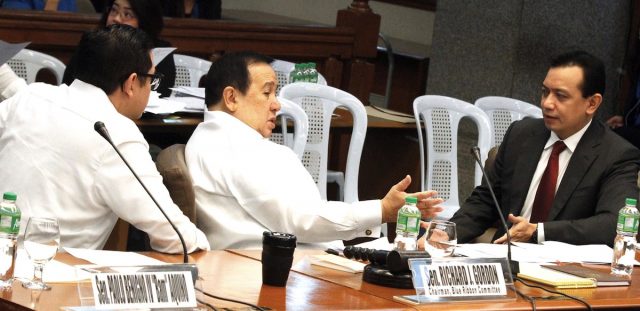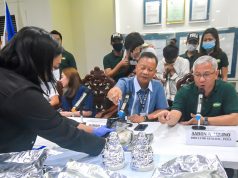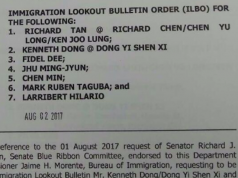
MANILA – (UPDATED 5:10 P.M) After another marathon hearing Tuesday on the smuggling of P6.4 billion worth of shabu into the Philippines, the chairman of the Senate panel leading the inquiry said it’s time to lean on China – source of the illegal drugs – to provide more information that will help pinpoint the culprits.
Sen. Richard Gordon, chairman of the blue ribbon committee, said his office had written Chinese authorities – who were first credited with alerting Philippine parties about the shipment – to get their cooperation in subsequent hearings.
Since the problem began in China – through the Hong Fei carrier – it should also end with China’s help, the senator said.
Gordon wants officials from China to appear in the next hearing and provide more details about the circumstances of the shipment, especially in light of information from the National Bureau of Investigation and the Philippine Drug Enforcement Agency that bulk of the shabu (methamphetamine hydrochloride) entering the country comes from China.
Gordon suspects a possible conspiracy between some Chinese groups and Richard Chen, owner of the warehouse in Valenzuela City where the shabu was delivered after it breezed through the the Bureau of Customs’ green lane.
Gordon said China should cooperate in the Senate investigation and failing that, it might be time to rethink Manila’s relations with Beijing.
“Mahirap makipag-deal sa China kung may pinapasok na droga [It’s hard to deal with China if illegal drugs are coming in here from them]. How many people are affected? China is shabulizing the country!” the senator said.
Gordon, a seasoned litigation lawyer before becoming a politician, even held out the possibility that some quarters in China may have been playing a game with the Philippine side. His basis: they told Richard Chen to allow the opening of the cargo, an act that prevented the full delivery to the ultimate destination. Philippine authorities were subsequently unable to track down the final recipients of the cargo. The result: shabu was seized but no one was arrested in the operation.
Gordon said the blue ribbon panel wrote the Chinese authorities through the office of Senate President Koko Pimentel to seek information on the ongoing investigation by the Chinese side of Hong Fei Logistics and Richard Chen.
The senator hopes Manila can get cooperation from Beijing through the Mutual Legal Assistance Treaty between China and the Philippines. That accord mandates cooperation between the neighbors in the prosecution of criminal offenses and proceedings on criminal matters.
Gordon on Tuesday said he would request Senate President Pimentel III to write a letter addressed to the Chinese government regarding the illegal drugs being shipped by Chinese nationals to the Philippines.
“We are going to request the Senate President to write a letter to make sure that the government of China takes note [of] the problems the Philippines is having with their nationals importing drugs in our country,” he said.
Citing government statistics, Gordon said about 65 percent of the arrested big-time drug personalities in 2016 were Chinese nationals, followed by Taiwanese nationals.
The senator likened the importation of illegal drugs from China to the Philippines to the opium war during the mid-1800s wherein British parties transported opium to China, where it was bought in large volumes. The influx of narcotics reversed the Chinese trade surplus, drained the economy of silver, and increased the numbers of opium addicts inside the country.
“Tulad ng ginawa sa inyo ng British, ‘wag niyong gawin sa amin ‘yan,” Gordon said. “Panahon nang manindigan tayo,” he added.
Chen told me to lie low – middleman
At Tuesday’s Senate hearing, Chinese businessman Manny Li, the middleman who brokered the delivery of the P6.4 billion worth of shabu from China, testified that Richard Chen, without offering an explanation, told him on Aug. 2 to leave the Philippines while the Senate was investigating how the drug shipment slipped pass Customs.
Li told senators that Chen also advised him to keep his cellphone turned on.
Chen is the owner of HongFei Logistics, the company which transported the 604 kilos of shabu from China to the Philippines.
Li further said that his friend Zhuang Jien Tan, who was linked to Chen, also called him up the following day with the same instructions and also asked him not to deposit Chen’s payment check worth P6 million for the 20 to 30 containers he asked to deliver.
On Aug. 9, while Chen and Li first appeared before the Senate, Zhuang Jien Tan contacted Li once again and asked him to tell senators that he knew Chen since January. However, Li admitted at the Aug. 29 hearing that his first contact with Chen was on May 26 after the BOC operations at the warehouse in Valenzuela. He said he later met Chen face-to-face on June 6.
Gordon surmised that the phone call to Li was made so that Chen would no longer be further implicated in the drug shipment issue. Li then agreed to Gordon’s statement.
When asked to explain his phone call, Chen said Li asked him not be involved since Chen still owed money to Li and other containers remained undelivered.









